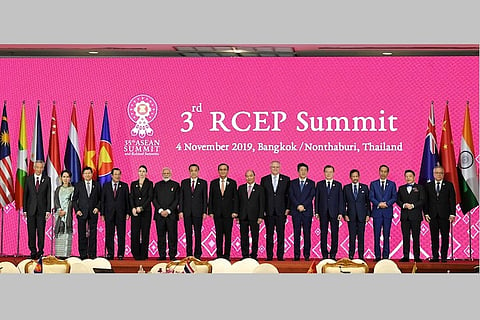

India on Monday decided against joining the 16-nation Regional Comprehensive Economic Partnership (RCEP) trade deal, saying it was not shying away from opening up to global competition across sectors but had made a strong case for an outcome which is favourable to all countries and all sectors.
The RCEP, a proposed free-trade agreement was to be signed by Indonesia, Thailand, Singapore, Malaysia, the Philippines, Vietnam, Myanmar, Brunei, Cambodia, Laos, Australia, China, India, Japan, New Zealand and Korea. Prime Minister Narendra Modi made the announcement that India would not be signing the deal at the East Asia summit, currently being held in Bangkok. The other 15 countries — which are part of ASEAN and their five free-trade agreement partners — are expected to sign the deal soon.
Modi reportedly said in his speech that, "the present form of the RCEP Agreement does not fully reflect the basic spirit and the agreed guiding principles of RCEP. It also does not address satisfactorily India's outstanding issues and concerns in such a situation.”
According to the Times of India, the Prime Minister said that the country’s farmers, traders, professionals and industries have stakes in such decisions. “Equally important are the workers and consumers, who make India a huge market and the third biggest economy in terms of purchasing power parity. When I measure the RCEP agreement with respect to the interests of all Indians, I do not get a positive answer. Therefore, neither the Talisman of Gandhiji nor my own conscience permit me to join RCEP,” he reportedly said.
Negotiations for RCEP went on for seven years. In his speech, Modi reportedly said that the current form of the agreement “does not fully reflect the basic spirit and the agreed guiding principles of RCEP.”
India’s issues over the agreement have been a long-standing problem, and while trade ministers of all 16 countries met during the sidelines of the ASEAN summit, the problems raised by India could not be resolved.
Issues which led to India staying away from the deal include ratchet obligation, an auto-trigger mechanism in case there is a sudden surge in import, and a base year for tariffs, among others.
There was a lot of opposition to India being a part of the agreement from multiple industries, as well as the BJP’s own ideological body, the Rashtriya Swayamsevak Sangh (RSS). One of the primary reasons for the opposition was the fear that the market would be flooded with foreign goods.